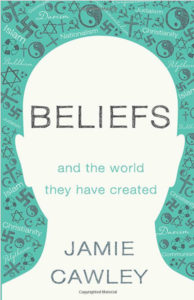
‘Beliefs’ answers the question, ‘What are the religions and ideologies?’ for the ten most important beliefs, each in one short, accessible chapter. There are notes on related issues and smaller beliefs between each chapter. Claims are substantiated by extensive end-notes and references to the scriptural sources.
We start by defining a Belief – a combination of faith, of the church and priests and of rules. Some believe in a single personal God, some in many humanlike ‘godlets’, others, like Buddhism and Communism, in impersonal mystic forces.
We start with the earliest Belief, Polytheism. This sees a world as influenced by the wishes of invisible magical beings, godlets. They explains why things happen – the destruction of a storm or the illness of a child. This Belief also allows people to do something about these mysterious event; they can sacrifice and pray to the the godlets, asking them to change what is happening. Polytheism is always has incompatible legends and inconsistencies, but, in every culture, even ones with no contact at all, the structure is the same. Why?
Judaism is the oldest written Belief (Zoroastrianism may be older but was written down much later). The sister Kingdoms of Israel and Judea wrote down their history, rules and legends before any other religion. After the fall of Israel, they were combined into one Torah in the exile in Babylon. It was during this exile, which only finally ended in 1947, that Judaism learned to survive in a hostile society through its many challenges until today.
Christianity was founded on three radically different documents: the Old Testament, the gospels and through St Paul’s letters, Greek philosophy. It grew up through 300 years of Roman opposition that made Christianity intolerant of other Beliefs and willing to convert by the sword. Over the years Christianity adapted into many different shapes, from the ‘rebranded polytheism’ of the middle ages, saints and the Virgin in richly decorated surroundings, to the bleak austerity of self-denying puritans. Today, it is still adapting to face modern challenges.
Islam was the creation of Mohammad ibn Abdul Muttalib. It is simple: one God, one prophet, one book of revelation. It was originally seen as the same faith as Judaism and Christianity but given to the Arabs in their own language and through their own Prophet. Mohammad and his successors conquered a huge area but much happened to split, bend and change its simplicity, until we get to the mixed Belief of today.
Nationalism arose in the 1750s, first taking power in the French Revolution. It created the idea of ‘Nations’, separate types of people, and spread it across Europe with flags, anthems and legends. As it created ‘Nations’ it created conflict them. Now in retreat in Europe, elsewhere it continues to encourage belief in the differences between people, nowadays often in its modern form, Racism.
Communism was a powerful synthesis of history, philosophy and politics. It was unified by Karl Marx in the Communist Manifesto of 1848. It systematised the desire to help the poor into what many saw as a scientific analysis, the same way that chemistry was creating order from medieval confusions. Communism was tried from 1917 to 1992 in several locations but failed to provide an improved society. It is the only major belief to have effectively died.
The connected Beliefs of Hinduism, Buddhism, Daoism and Confucianism are reviewed together. Mutual tolerance and lack of central control have led to a broad spread of faith, from an ornamented polytheism to gentle mysticism with few borders or conflicts between them
Environmentalism is a guilty response to the destruction and mess linked to a uniquely wealthy and peaceful generation. With the traditional Puritan view that wilful pleasure brings retribution, Environmentalism finds many ‘scientific’ ways in which consumption will result in destruction.
Finally, we look at what Beliefs will arise in future and how they are likely to affect humankind, concluding that we may possibly be able to avoid the destructive impact of some of them. Perhaps.

